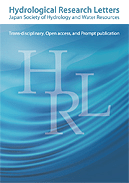
Hydrological Research Letters
Scope & Guideline
Catalyzing Change: Essential Insights for Water Management
Introduction
Aims and Scopes
- Hydrological Modeling and Simulation:
The journal publishes research on advanced hydrological models that simulate water movement, quality, and availability in different contexts, incorporating various climatic and land-use scenarios. - Water Resource Management:
Research focuses on sustainable management of water resources, including reservoir operations, flood control strategies, and agricultural water use, often considering socio-economic implications. - Climate Impact Studies:
Articles investigate the effects of climate change on hydrological systems, including alterations in precipitation patterns, runoff characteristics, and groundwater systems. - Sediment Transport and Erosion:
The journal explores methodologies for estimating sediment discharge and understanding the impacts of land use on soil erosion processes. - Integrated Water Resource Management (IWRM):
Research highlights integrated approaches that consider the interconnection between water systems, land use, and ecological health, promoting sustainable practices. - Groundwater Studies:
The journal emphasizes research on groundwater systems, including recharge, discharge, and the impact of geological variations on groundwater flow. - Remote Sensing and Earth Observation Applications:
Papers leverage remote sensing technologies for hydrological monitoring, including precipitation estimation and water quality assessments.
Trending and Emerging
- Integration of Machine Learning in Hydrology:
There is a growing trend in applying machine learning techniques for hydrological predictions, flood susceptibility assessments, and optimizing water management strategies. - Climate Change Adaptation Strategies:
Research increasingly focuses on developing and assessing strategies to adapt hydrological systems to the impacts of climate change, addressing urgent environmental challenges. - Socio-Hydrology:
The incorporation of socio-economic factors into hydrological modeling is on the rise, reflecting a more holistic understanding of water resource management. - Sediment Dynamics in Relation to Land Use Changes:
Emerging studies are investigating the relationship between land use changes and sediment transport dynamics, aiming to inform sustainable management practices. - Remote Sensing Innovations:
There is a notable increase in the use of innovative remote sensing technologies for hydrological monitoring, particularly in estimating precipitation and managing water resources. - Interdisciplinary Approaches to Water Resource Challenges:
Research increasingly emphasizes interdisciplinary collaboration, merging hydrology with ecology, urban planning, and climate science to address complex water-related issues.
Declining or Waning
- Traditional Hydrological Measurements:
There seems to be a declining focus on conventional field measurements for hydrological studies, possibly due to the increased reliance on remote sensing and modeling techniques. - Localized Case Studies:
Research that focuses solely on localized case studies without broader implications or integrations into larger hydrological frameworks is becoming less common. - Historical Hydrology Studies:
Investigations into historical hydrological patterns and their implications are less frequently published, indicating a shift towards more contemporary and predictive studies. - Water Quality Assessment Through Conventional Methods:
There is a decline in studies utilizing traditional water quality assessment methods, as more innovative and technology-driven approaches gain popularity.
Similar Journals
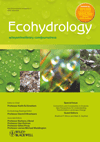
Ecohydrology
Transforming Research into Ecological InsightsEcohydrology is a prestigious academic journal published by WILEY that focuses on the interplay between ecological and hydrological systems. With a robust ISSN of 1936-0584 and E-ISSN 1936-0592, it has established itself as a leading source in its field since its inception in 2009. Positioned in the top quartile (Q1) of various categories, including Aquatic Science, Earth-Surface Processes, and Ecology, the journal leverages its high impact factor to attract significant scholarly contributions. The recent rankings in Scopus place Ecohydrology among the top-tier journals, with notable percentile standings—79th in Ecology, Evolution, Behavior and Systematics, and 77th in both Aquatic Science and Environmental Science. Aimed at researchers, professionals, and students, the journal provides a vital platform for disseminating new insights and methodologies that address pressing environmental challenges. Despite not being an open-access journal, Ecohydrology offers a wealth of knowledge that is crucial for advancing our understanding of ecosystem dynamics and sustainable water resource management.

Journal of Applied Water Engineering and Research
Bridging Theory and Practice in Water EngineeringJournal of Applied Water Engineering and Research is a dynamic platform dedicated to the advancement of knowledge in the field of water science and technology. Published by Taylor & Francis Ltd, this journal aims to bridge the gap between theoretical research and practical applications in water engineering, providing a crucial resource for researchers, practitioners, and policymakers. With an ISSN of 2324-9676 and an impressive ranking in the Q3 category for Water Science and Technology, it occupies a distinctive position within the scholarly community. The journal covers a wide spectrum of topics, including innovative water management strategies, sustainable practices, and the integration of technology in water resource management, thus contributing significantly to the discourse surrounding environmental sustainability. With publication years converging from 2013 to 2024, the Journal of Applied Water Engineering and Research continues to foster impactful research, enhancing our understanding and management of vital water resources.

Carpathian Journal of Earth and Environmental Sciences
Championing High-Quality Research in Earth SciencesCarpathian Journal of Earth and Environmental Sciences is a distinguished academic journal dedicated to advancing the interdisciplinary field of Earth and environmental sciences. Published by the Carpathian Association for Environment and Earth Sciences, this journal plays a pivotal role in disseminating high-quality research focused on the dynamic interactions between geological processes and environmental changes. With an ISSN of 1842-4090 and an E-ISSN of 1844-489X, the journal is indexed in Scopus and holds an esteemed Q3 quartile ranking in both Earth and Planetary Sciences and Environmental Science categories as of 2023. Since its inception in 2008, the Carpathian Journal has provided an open access platform for researchers, professionals, and students to share insights, foster collaboration, and engage in critical discussions on pressing environmental issues. By continuously contributing to the body of knowledge in this field, the journal not only enhances academic discourse but also promotes sustainable environmental practices across Romania and beyond.

JOURNAL OF THE AMERICAN WATER RESOURCES ASSOCIATION
Leading the charge in water resource research since 1967.The JOURNAL OF THE AMERICAN WATER RESOURCES ASSOCIATION, published by Wiley, is a premier platform dedicated to advancing the field of water resource management and research. With an ISSN of 1093-474X and an impressive Q1 ranking in multiple categories, including Earth-Surface Processes, Ecology, and Water Science and Technology, this journal serves as a vital resource for professionals, researchers, and students alike. Established in 1967 and set to converge through 2024, it has consistently published cutting-edge research that influences policy and practice in water resource management. The journal's open access option enhances its reach, ensuring that critical findings are accessible to a wider audience. The Scopus rankings further underscore its impact, placing it in the top quartile within its fields, highlighting its importance in shaping scholarly discourse. As a significant contributor to the understanding and management of freshwater systems, the journal offers a crucial means for sharing insights and fostering collaboration in the vital realm of water resources.

Water Resources
Pioneering interdisciplinary research for water resilience.Water Resources, a prominent journal published by MAIK NAUKA/INTERPERIODICA/SPRINGER, focuses on the critical and evolving field of water science and technology. Established in 1976 and with a long-standing commitment to advancing knowledge, this journal explores interdisciplinary research that addresses the challenges surrounding water resource management, quality, and sustainability. With an impact factor positioned within the Q3 category of its field, it holds a notable Scopus rank (#181/261) in Environmental Science, emphasizing its role in driving scholarly discourse. While currently not open access, Water Resources provides vital insights for researchers, professionals, and students, making it an essential resource for those seeking to innovate and implement effective water management solutions. To stay ahead in a domain that is increasingly paramount to global sustainability efforts, consider engaging with the latest research published in this vital journal.
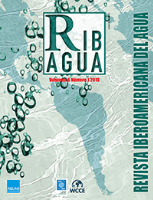
RIBAGUA-Revista Iberoamericana del Agua
Exploring innovative solutions for sustainable water management.RIBAGUA-Revista Iberoamericana del Agua is an esteemed academic journal dedicated to the study and dissemination of water-related research within the Ibero-American context. Published by TAYLOR & FRANCIS LTD, this Open Access journal has been providing a platform for scholarly articles since 2015, promoting visibility and accessibility for researchers, professionals, and students engaged in environmental science, hydrology, and water resource management. With the objective of enhancing the understanding of water issues affecting the Ibero-American region, RIBAGUA invites contributions that address innovative practices, policy implications, and scientific advancements. By fostering inter-regional dialogue and collaboration, it stands as a vital resource for those looking to contribute to sustainable water management solutions. The journal is committed to maintaining high standards of academic integrity and is ideal for anyone seeking to advance their knowledge and research in the water sciences.

Journal of Hydrology and Hydromechanics
Pioneering insights into fluid flow and water systems.Journal of Hydrology and Hydromechanics, published by SCIENDO, is a prominent open access journal that has been disseminating crucial research findings in the fields of fluid flow, mechanical engineering, and water science since its inception in 1973. With its open access model established in 2009, the journal ensures that innovative research is available to a global audience, enhancing the visibility and impact of studies related to hydrological systems and their applications. The journal holds a commendable position within the academic community, reflected in its category quartiles, achieving Q2 rankings in 2023 across key areas such as Fluid Flow and Transfer Processes, Mechanical Engineering, and Water Science and Technology. Its Scopus rankings further highlight its relevance, placing it among the top journals in its categories. The Journal of Hydrology and Hydromechanics not only serves as a vital resource for researchers and professionals aiming to advance hydrological knowledge but also provides students with a wealth of information to better understand the complexities of water dynamics and associated engineering challenges.
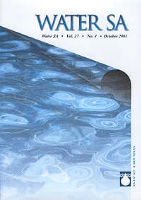
WATER SA
Illuminating solutions to global water challenges.WATER SA, published by the WATER RESEARCH COMMISSION, serves as a pivotal platform for interdisciplinary research in the areas of water science and technology. With an ISSN of 0378-4738 and an E-ISSN of 1816-7950, this open-access journal has been committed to disseminating knowledge since 2005, ensuring that research is freely accessible to a global audience. As of 2023, it holds a Q3 ranking in several key categories including Applied Microbiology and Biotechnology, Management, Monitoring, Policy and Law, Waste Management and Disposal, and Water Science and Technology. These rankings reflect its significant contribution to these disciplines, particularly in South Africa where it is based. With a history dating back to 1976 and converging research efforts extending through 2024, WATER SA aims to illuminate pressing water-related challenges and foster innovative solutions through rigorous scientific inquiry. Researchers, professionals, and students interested in the sustainability and management of water resources will find its comprehensive portfolio essential for advancing their work and understanding in an increasingly critical field.
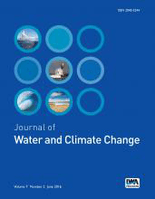
Journal of Water and Climate Change
Bridging Water Wisdom and Climate InsightsJournal of Water and Climate Change is a premier open-access journal published by IWA Publishing, dedicated to advancing the understanding of the interplay between water resources and climate change. With an ISSN of 2040-2244 and an E-ISSN of 2408-9354, this journal has established itself as a crucial platform for interdisciplinary research, publishing high-quality articles that address the challenges posed by climate variability on water systems globally. Since achieving open access status in 2021, the journal has fostered wider dissemination of knowledge among its audience, featuring works that span pivotal topics in Atmospheric Science, Global and Planetary Change, and Water Management. Notably ranked within the top quartiles in several relevant categories as of 2023, it occupies a vital position in the academic community, offering insights that are essential for policymakers, environmental scientists, and researchers striving to create sustainable solutions for water and climate challenges. Its commitment to excellence is reflected in its strong Scopus rankings, standing at the 66th percentile in Water Science and Technology and 65th percentile in Management, Monitoring, Policy, and Law. Located in the United Kingdom, this journal not only serves as a repository of cutting-edge research from 2010 to 2024 but also engages a diverse readership passionate about promoting sustainable water management practices.
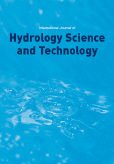
International Journal of Hydrology Science and Technology
Transforming Water Science through Groundbreaking ResearchThe International Journal of Hydrology Science and Technology, published by InderScience Enterprises Ltd, is a distinguished platform dedicated to advancing knowledge in the field of hydrology, environmental engineering, and water science. With an ISSN of 2042-7808 and an E-ISSN of 2042-7816, this journal, established in 2011 and continuing through 2024, serves as an essential resource for researchers, professionals, and students alike. Despite being categorized in the Q3 quartile across multiple disciplines including Earth and Planetary Sciences, Environmental Engineering, Waste Management and Disposal, and Water Science and Technology, the journal maintains a reputation for contributing significant findings that impact both theory and practical applications in addressing hydrological challenges. Currently unavailable through Open Access options, the journal remains committed to disseminating valuable research that informs sustainable practices in water resource management. The editorial team encourages submissions that explore innovative strategies and methodologies while fostering interdisciplinary discussions, making this journal a pivotal player in shaping the future of hydrological science.